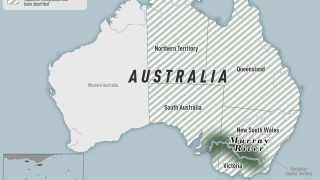Queensland Confirms Japanese Encephalitis Virus Infected Humans

Australia's Acting Chief Medical Officer, Dr. Sonya Bennett, declared today the unfolding situation in Australia concerning the Japanese encephalitis virus (JEV), a Communicable Disease Incident of National Significance.
On March 3, 2022, Queensland officials confirmed a human case of JEV.
The case had recently traveled in regional parts of the state's south and is being treated in a Brisbane hospital.
The Department of Health is aware of other JEV cases in multiple states of encephalitis of unknown origin.
These cases are being investigated for arboviral diseases, including JEV.
Humans can become infected with JEV through the bite of an infected mosquito. However, the virus cannot be transmitted between humans.
Dr. Bennett's declaration on March 4, 2022, included, "A national working group of communicable disease, vaccine, and arbovirus experts has been established to support the response, including mosquito surveillance and control measures and identification of those at direct risk, and for the rollout of vaccines.'
JEV is a mosquito-borne viral disease that mainly occurs in pigs and horses but can cause disease in people and rarely other animals.
Pigs are the focus from a human health perspective as they can infect mosquitoes that can then infect humans.
This is not the case with horses.
The vast majority of infected people will show mild or no symptoms at all. Additionally, Australia's Chief Veterinary Officer, Dr. Mark Schipp, stated JEV had been confirmed at 14 piggeries across NSW, SA, Queensland, and Victoria.
"The key signs to look out for in pigs are stillborn or weak piglets, some with an impaired nervous system."
"Piglets can develop encephalitis or wasting, depression or hindlimb paralysis. However, adult sows do not typically show signs of disease," Dr. Schipp added.
"People working with pigs, even if they're only a backyard pet or a small herd, should take steps to control mosquitoes, as well as continuing to practice good biosecurity."
"Horse owners can also put measures in place to help their horses avoid mosquito bites, including using hooded rugs, fly masks, and applying a safe insect repellent."
"If you suspect an animal is showing signs of the disease, you must report it via your local veterinarian or the national Emergency Animal Disease Watch Hotline on 1800 675 888."
Less than 1% of people infected may develop a serious illness such as encephalitis and experience symptoms including neck stiffness, severe headache and coma, and more rarely, permanent neurological complications or death.
A study from October 2021 found based on the baseline number of people at risk of infection, there were an estimated 56,847 (95% CI: 18,003-184,525) JE cases and 20,642 (95% CI: 2,252-77,204) deaths in 2019.
India had the largest estimated JE burden in 2019, followed by Bangladesh and China.
There are two JEV vaccines available globally.
In the U.S., Ixiaro is an inactivated, adsorbed Vero cell culture-derived vaccine. It is prepared by propagating JEV strain SA14-14-2 in Vero cells.
Our Trust Standards: Medical Advisory Committee







